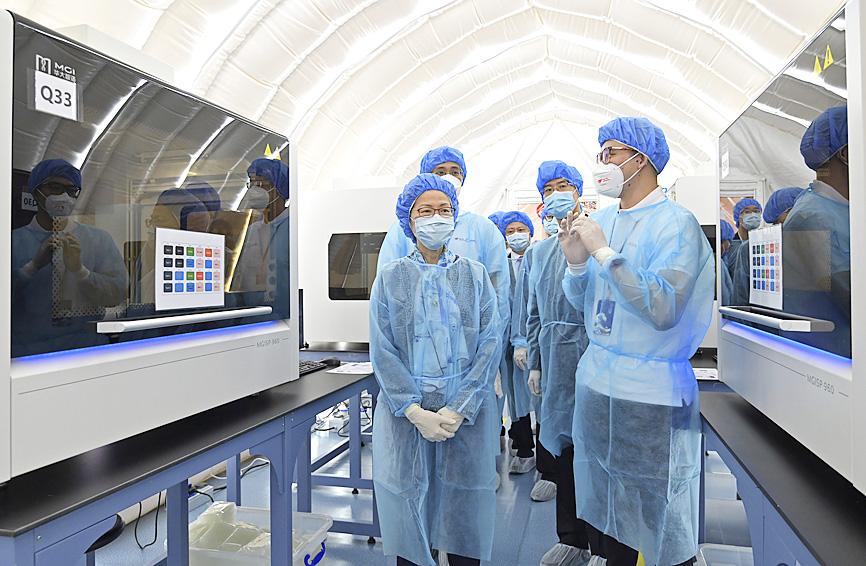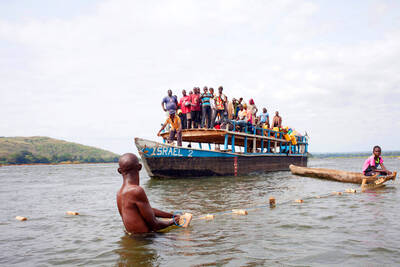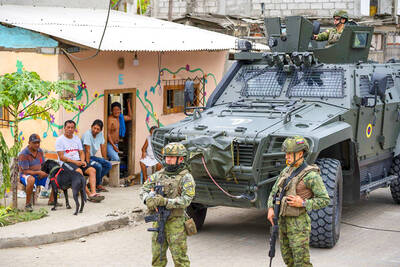Hong Kong’s plan to offer free COVID-19 tests to all residents has become swept up in the festering political debate dividing the territory, where many remain deeply distrustful of both local and mainland Chinese leaders.
Billed as a benevolent public health initiative made possible with the help of Beijing, the territory-wide tests are set to start on Tuesday.
However, the involvement of doctors and companies from mainland China has sent the rumor mills into overdrive and compounded fears of Beijing’s surveillance state, while many health experts in the territory have questioned the efficacy of a mass testing program.

Photo: AP/ Hong Kong Government Information Services
On the Chinese mainland, biometric data forms a crucial part of Beijing’s vast security dragnet, and many Hong Kongers fear that mass testing might lead to widespread DNA collection — something the territory’s authorities have strenuously denied.
The furore illustrates the polarization in Hong Kong, as Beijing clamps down on its critics after months of huge, often violent and ultimately unsuccessful pro-democracy protests last year. “Public trust in Hong Kong’s government has been hovering at all-time lows for many months,” said Dixon Sing (成名), a political expert at the Hong Kong University of Science and Technology. China’s involvement in the testing scheme “simply intensifies that distrust among the majority of the population,” Sing said.
Hong Kong had an enviable track record of keeping COVID-19 under control until last month when infections began to soar, brought in by small groups of arrivals to the territory who were exempted from strict quarantine controls.
New cases rose to more than 150 a day and Hong Kong went back into an economically painful semi-lockdown.
Citing the spike in COVID-19 infections, Hong Kong Chief Executive Carrie Lam (林鄭月娥) on July 31 postponed local elections for a year.
Daily infections have since dropped to the low double digits, but authorities believe that mass testing would help eliminate the spread due to asymptomatic people carrying the virus.
More than 100 locations across the territory, including schools and sports stadiums, have been set up to offer tests, staffed by about5,000 volunteers. “Although the tests are voluntary, we hope the public will take part together, for themselves and for society,” Hong Kong Secretary for Constitutional and Mainland Affairs Patrick Nip (聶德權) said earlier this week.
It is far from clear whether the majority of Hong Kongers would register given the government’s record-low approval ratings, especially after Beijing imposed a National Security Law on the territory in late June to stamp out pro-democracy protests. Hong Kong tycoon and democracy activist Jimmy Lai (黎智英), who was earlier this month arrested under that law, said on Twitter that non-compliance with the mass testing might be a form of “passive resistance.”
The National Security Law “atrophied trust in HK government, making it impossible to govern,” he wrote alongside a link to a story on the testing scheme.
A major source of contention has been the involvement of three Chinese testing firms and doctors from mainland China. Facebook groups have been filled with concerns ranging from whether the tests will meet international standards, fears of DNA collection and whether Hong Kong might introduce health apps used by Beijing to control where people can travel.

‘IN A DIFFERENT PLACE’: The envoy first visited Shanghai, where he attended a Chinese basketball playoff match, and is to meet top officials in Beijing tomorrow US Secretary of State Antony Blinken yesterday arrived in China on his second visit in a year as the US ramps up pressure on its rival over its support for Russia while also seeking to manage tensions with Beijing. The US diplomat tomorrow is to meet China’s top brass in Beijing, where he is also expected to plead for restraint as Taiwan inaugurates president-elect William Lai (賴清德), and to raise US concerns on Chinese trade practices. However, Blinken is also seeking to stabilize ties, with tensions between the world’s two largest economies easing since his previous visit in June last year. At the

Beijing is continuing to commit genocide and crimes against humanity against Uyghurs and other Muslim minorities in its western Xinjiang province, U.S. Secretary of State Antony Blinken said in a report published on Monday, ahead of his planned visit to China this week. The State Department’s annual human rights report, which documents abuses recorded all over the world during the previous calendar year, repeated language from previous years on the treatment of Muslims in Xinjiang, but the publication raises the issue ahead of delicate talks, including on the war in Ukraine and global trade, between the top U.S. diplomat and Chinese

RIVER TRAGEDY: Local fishers and residents helped rescue people after the vessel capsized, while motorbike taxis evacuated some of the injured At least 58 people going to a funeral died after their overloaded river boat capsized in the Central African Republic’s (CAR) capital, Bangui, the head of civil protection said on Saturday. “We were able to extract 58 lifeless bodies,” Thomas Djimasse told Radio Guira. “We don’t know the total number of people who are underwater. According to witnesses and videos on social media, the wooden boat was carrying more than 300 people — some standing and others perched on wooden structures — when it sank on the Mpoko River on Friday. The vessel was heading to the funeral of a village chief in

REGIONAL TENSIONS: China boosted spending on its military for the 29th straight year, raising it by 6% to US$296bn, while Taiwan spent US$16.6bn, an 11% increase Global military expenditure recorded its steepest increase in over a decade last year, reaching an all-time high of US$2.4 trillion as wars and rising tensions fueled spending across the world, researchers said yesterday. Military spending rose across the globe with particularly large increases in Europe, the Middle East and Asia, according to a new report by the Stockholm International Peace Research Institute (SIPRI). “Total military spending is at an all-time high ... and for the first time since 2009, we saw spending increase across all five geographical regions,” SIPRI senior researcher Nan Tian said. Military spending rose by 6.8 percent last year, the